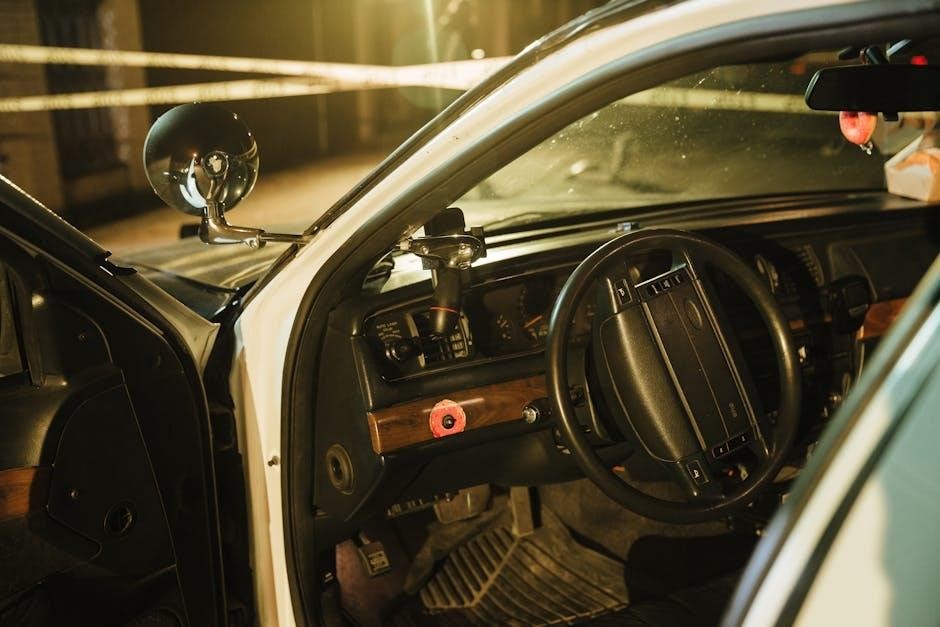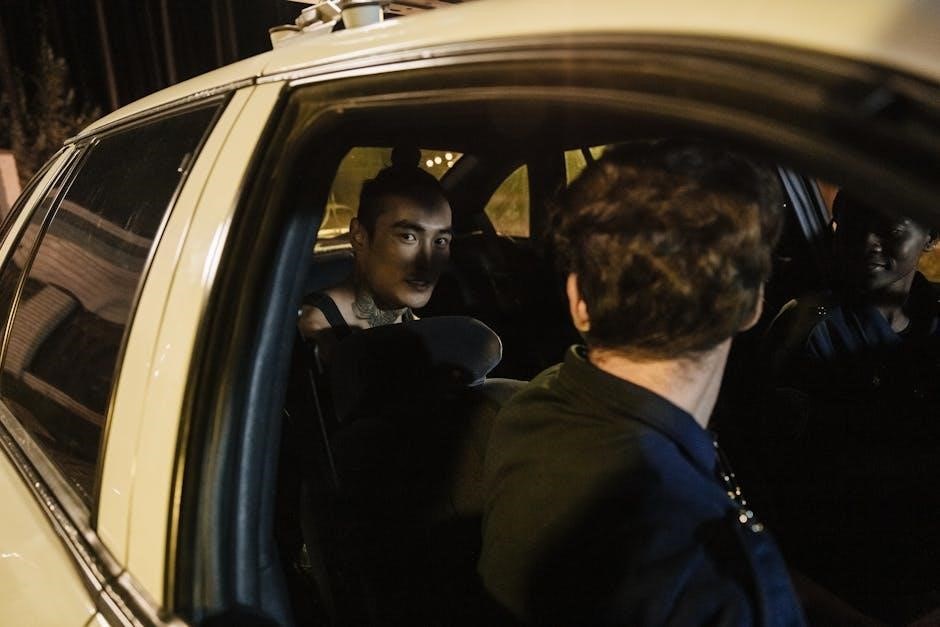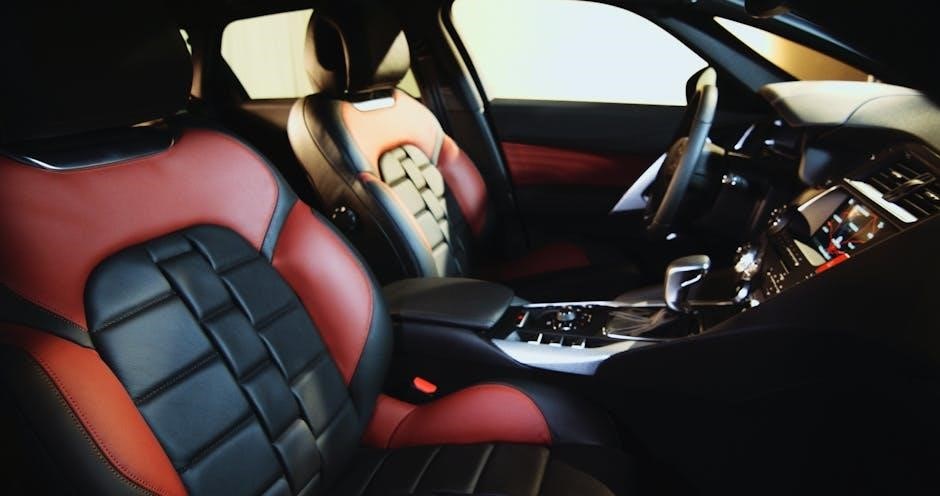Maine’s car seat laws for 2024 emphasize enhanced safety measures for children, focusing on age, weight, and proper restraint systems to ensure optimal protection while traveling.
1.1 Overview of the Importance of Car Seat Safety in Maine
Car seat safety in Maine is crucial due to the high rate of incorrect usage, with over 90% of car seats not installed properly. Proper restraints significantly reduce the risk of injury or fatality, especially for children under 12. Maine’s strict laws aim to protect young passengers by ensuring they are secured correctly, promoting a safer driving environment for all.
1;2 Brief History of Car Seat Law Updates in Maine
Maine’s car seat laws have evolved significantly, with key updates in 2019 requiring rear-facing seats for children under 2 and in 2020 extending weight limits for forward-facing seats to 55 pounds. These changes reflect a commitment to aligning with best safety practices, ensuring children are protected based on current research and standards.
Key Requirements of Maine Car Seat Laws 2024
Maine’s 2024 car seat laws require rear-facing seats for children under 2, forward-facing seats for those over 2 but under 55 pounds, and boosters for children between 40-80 pounds or under 8 years old.
2.1 Rear-Facing Car Seats for Children Under 2 Years Old
Maine law requires children under 2 years old to ride in a rear-facing car seat. This ensures optimal protection for their developing neck and spine during sudden stops or crashes. The seat must be properly installed in the back seat, never in front of an active airbag, to minimize risks and maximize safety for young children.
2.2 Forward-Facing Car Seats for Children Over 2 but Under 55 Pounds
Maine car seat laws require children over 2 years old and under 55 pounds to use a forward-facing car seat with a harness. This seat must be installed in the back seat, using the vehicle’s seat belt or LATCH system to ensure proper securement. The harness should be snug and correctly positioned to protect the child’s body during a crash.
2.3 Booster Seats for Children Between 40-80 Pounds and Under 8 Years Old
Maine car seat laws require children between 40-80 pounds and under 8 years old to use a booster seat. The booster must be used with a lap and shoulder belt, ensuring proper fit and positioning. This phase is crucial as it bridges the gap between forward-facing seats and adult seat belts, providing essential safety until the child can safely use the vehicle’s seat belt alone.
Age, Weight, and Height Requirements
Maine’s car seat laws specify requirements based on age, weight, and height. Children under 2 must use rear-facing seats, while those over 2 and under 55 pounds need forward-facing seats. Booster seats are required for children between 40-80 pounds, under 8 years old, or shorter than 4 feet 9 inches. Children under 12 must ride in the rear seat if possible.
3.1 Children Under 12 Years Old: Rear Seat Requirement
Maine law requires children under 12 years old to be properly secured in the rear seat, if possible, to minimize risks associated with front-seat airbag deployment. This regulation ensures enhanced safety for younger passengers by reducing exposure to potential hazards in the front seat, aligning with national child passenger safety recommendations.
3.2 Height and Weight Thresholds for Transitioning to Seat Belts
In Maine, children can transition to seat belts when they weigh between 40-80 pounds, are under 4 feet 9 inches tall, and are under 8 years old. This ensures proper fit and safety, aligning with guidelines to prevent premature use of adult seat belts without a booster, reducing injury risks.
Exceptions and Exemptions
Maine car seat laws include exemptions for medical conditions and certain vehicles, provided proper documentation is submitted to ensure compliance with safety regulations.
4.1 Medical Exemptions for Car Seat Usage
Medical exemptions for car seat usage in Maine require a physician’s documentation, allowing exceptions for children with specific medical conditions that prevent proper car seat restraint.
4.2 Vehicles Exempt from Car Seat Requirements
Certain vehicles are exempt from car seat requirements in Maine, including buses, taxis, and emergency vehicles. Classic or antique cars without factory-installed seat belts may also be exempt. These exemptions are based on specific conditions or vehicle characteristics, ensuring safety while accommodating unique circumstances.

Enforcement and Penalties
Violations of Maine’s car seat laws result in fines of up to $137 and may include points added to the driver’s record. Enforcement prioritizes proper securing of children to ensure compliance and safety.
5.1 Fines for Non-Compliance with Car Seat Laws
Non-compliance with Maine’s car seat laws can result in fines of up to $137. Penalties may also include points added to the driver’s record. Enforcement aims to ensure children are properly secured, with fines serving as a deterrent to promote adherence to safety regulations and protect young passengers effectively.
5.2 Proper Securing of Children in Vehicles
Properly securing children in vehicles is critical under Maine law. Rear-facing seats are required for children under 2, while forward-facing seats are needed for those over 2 but under 55 pounds. Booster seats are mandatory for children between 40-80 pounds and under 8 years old. Ensure correct installation, tight harnesses, and proper seat belt usage to maximize safety and comply with regulations.
Resources and Support
Maine offers free or low-cost car seat programs, check events, and official PDF guidelines to help families comply with safety laws and ensure proper installation.
6.1 Free or Low-Cost Car Seat Programs in Maine
Maine offers free or low-cost car seat programs for eligible families, ensuring all children can travel safely. Income-eligible families may receive no-cost seats through state-funded initiatives. Distribution sites and local agencies provide access to these resources, helping parents comply with safety laws. Contact the Maine Bureau of Highway Safety for more information and eligibility details.
6.2 Car Seat Check Events and Distribution Sites
Maine hosts regular car seat check events to ensure proper installation and safety. Trained technicians provide free inspections and guidance. Distribution sites across the state offer free or low-cost seats, especially for income-eligible families. These events aim to educate parents and improve child passenger safety throughout Maine, promoting compliance with updated car seat laws.
6.3 Official PDF Documents and Guidelines
The Maine Bureau of Highway Safety provides official PDF documents detailing car seat laws and safety tips. These include the Maine Child Passenger Safety Law and Car Seat Safety Tips, offering comprehensive guidelines for proper installation and usage. Visit their website for downloadable resources to ensure compliance with 2024 regulations and keep children safe while traveling.
Adhering to Maine’s 2024 car seat laws ensures children’s safety on the road. Future updates will continue prioritizing protection and awareness for all passengers.
7.1 Importance of Adhering to Maine Car Seat Laws
Adhering to Maine’s car seat laws is crucial for protecting children from injuries and fatalities. Properly securing children reduces risks by up to 70%. Non-compliance can result in fines and jeopardize safety. Following these laws ensures optimal protection, setting a lifelong example for responsible road behavior and safeguarding young lives on Maine’s roads.
7.2 Future Updates and Awareness Campaigns
Maine continues to update car seat laws to align with safety advancements. Future updates may include extended weight limits or height requirements. Awareness campaigns will focus on correcting common installation mistakes and promoting proper usage. These efforts aim to ensure all caregivers understand and comply with safety guidelines, supported by free resources like car seat check events and educational materials.
Additional Tips for Proper Car Seat Installation
Proper car seat installation involves ensuring a snug fit, using LATCH correctly, and avoiding common mistakes like loose straps or incorrect angle adjustments for optimal safety.
8.1 Common Mistakes to Avoid in Car Seat Installation
Common mistakes include loose harnesses, incorrect rear-facing angles, and improper LATCH usage. Ensure the car seat is snug, straps are tight, and the base is level. Avoid using expired or damaged seats, and never install a rear-facing seat in the front if airbags are active. Always follow the manufacturer’s instructions for proper installation.
8.2 Role of Parents and Caregivers in Ensuring Safety
Parents and caregivers play a crucial role in ensuring car seat safety by properly installing seats, adhering to weight and height guidelines, and regularly inspecting for wear or damage. Education and vigilance are key to preventing accidents. Staying informed about updates to Maine’s car seat laws and seeking professional assistance when needed can significantly enhance a child’s safety while traveling.

Frequently Asked Questions
Common questions include when a child can sit in the front seat and how to choose the right car seat, ensuring compliance with Maine’s safety regulations.
9.1 When Can a Child Sit in the Front Seat in Maine?
In Maine, children under 12 years old are required to sit in the rear seat if possible. Front seat permission begins at age 12 or when rear seating is unavailable.
9.2 How to Choose the Right Car Seat for Your Child
Selecting the right car seat involves assessing your child’s age, weight, and height. Rear-facing seats are for children under 2 years or until they outgrow the seat. Forward-facing seats are for children over 2 but under 55 pounds, while booster seats are required for children between 40-80 pounds until they can safely use a seat belt. Always check expiration dates and vehicle compatibility, and consult Maine’s official guidelines or certified experts for proper installation and selection.

Contact Information for Further Assistance
For inquiries about Maine car seat laws, contact the Maine Bureau of Highway Safety at 207-626-3840 or visit their official website for detailed resources and support.
10.1 Maine Bureau of Highway Safety Contact Details
The Maine Bureau of Highway Safety can be reached at 207-626-3840 for guidance on car seat laws. They provide resources, including official PDF documents, to ensure compliance and safety for children. Their office is available to assist with inquiries related to child passenger safety and car seat requirements in Maine.
10.2 Local Agencies Providing Car Seat Support
Local agencies in Maine, including non-profits and community organizations, offer free or low-cost car seat programs. These agencies provide education, installation guidance, and car seat distribution. Families can access these resources through partnerships with local hospitals, fire departments, and social service organizations. Contact the Maine Bureau of Highway Safety for a list of nearby providers and event schedules.

Final Thoughts on Car Seat Safety
Car seats are crucial for preventing injuries and fatalities, making adherence to Maine’s laws essential for child safety. Compliance ensures protection and promotes a safer community.
11.1 The Role of Car Seats in Preventing Injuries and Fatalities
Car seats play a vital role in reducing child injuries and fatalities by providing essential protection during accidents. Properly installed seats ensure children’s vulnerability is minimized, with data showing a significant reduction in fatal outcomes. Maine’s strict laws emphasize correct usage, as over 90% of car seats are misused, highlighting the need for compliance and education to save lives.
11.2 Encouraging Compliance for the Safety of All Children
Encouraging adherence to Maine’s car seat laws is crucial for protecting children. Community programs, educational campaigns, and free resources help parents understand proper car seat installation and usage. Compliance ensures children’s safety, reducing injury risks. Maine’s efforts to educate and assist families foster a culture of safety, benefiting all children statewide.
References and Sources
Key sources include official Maine Legislature documents, the Maine Bureau of Highway Safety, and PDF guidelines like “Maine Child Passenger Safety Law” and “Car Seat Safety Tips.”
12.1 Maine Legislature and Official Documents
The Maine Legislature provides detailed car seat regulations through official documents like PL 2019, c. 577, which outlines child passenger safety laws. The Maine Child Passenger Safety Law and Car Seat Safety Tips PDFs offer comprehensive guidelines, ensuring compliance with updated safety standards for children of all ages and weights in vehicles across Maine.
12.2 Reliable Websites and Safety Organizations
Reliable sources include the National Highway Traffic Safety Administration (NHTSA) and Safe Kids Worldwide, offering car seat guidelines and tools. The Maine Bureau of Highway Safety provides official PDFs, checklists, and installation guides. These organizations ensure accurate and up-to-date information to help parents comply with Maine’s car seat laws and keep children safe while traveling.
Acknowledgments
Special thanks to safety experts, advocates, and organizations for their contributions to Maine’s car seat safety initiatives and guidelines, ensuring accurate and life-saving information for all families.
13.1 Contributions from Safety Experts and Advocates
The dedication of safety experts and advocates has been instrumental in shaping Maine’s car seat laws. Their expertise ensures the guidelines are evidence-based, reflecting best practices to protect children. Collaborations with local organizations and distribution sites further enhance community outreach, providing accessible resources and education to families statewide, promoting optimal child passenger safety.
13.2 Gratitude to Readers for Promoting Car Seat Safety
A heartfelt thank you to our readers for their active role in promoting car seat safety across Maine. Your dedication to sharing information, attending safety events, and advocating for proper car seat usage has significantly contributed to a safer community for children. Together, we can continue to educate and protect, ensuring all kids travel safely.

Leave a Reply
You must be logged in to post a comment.